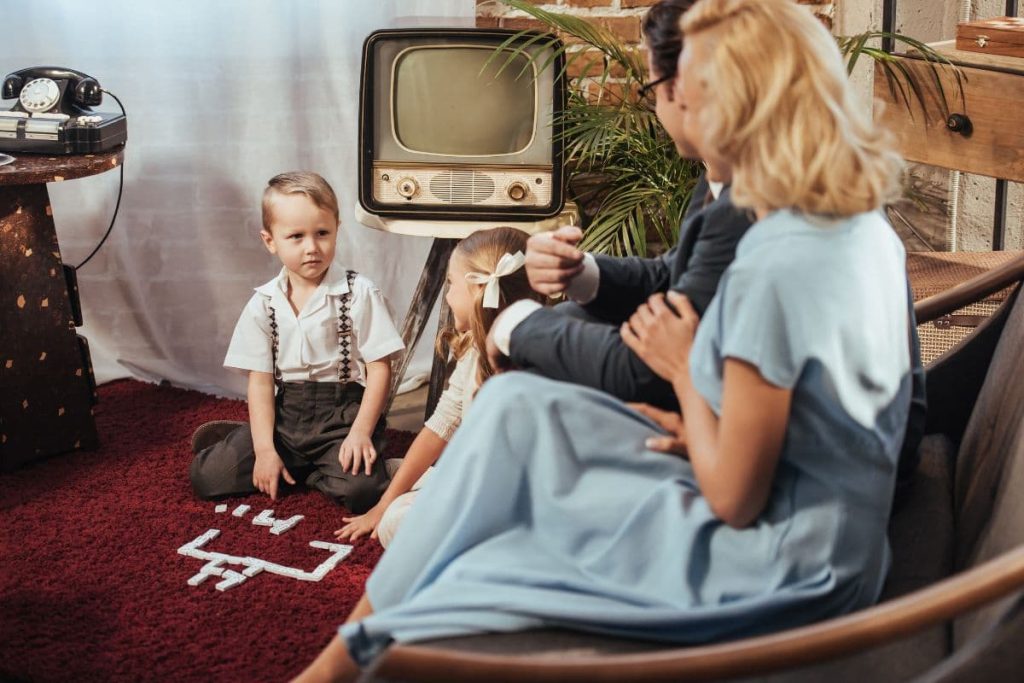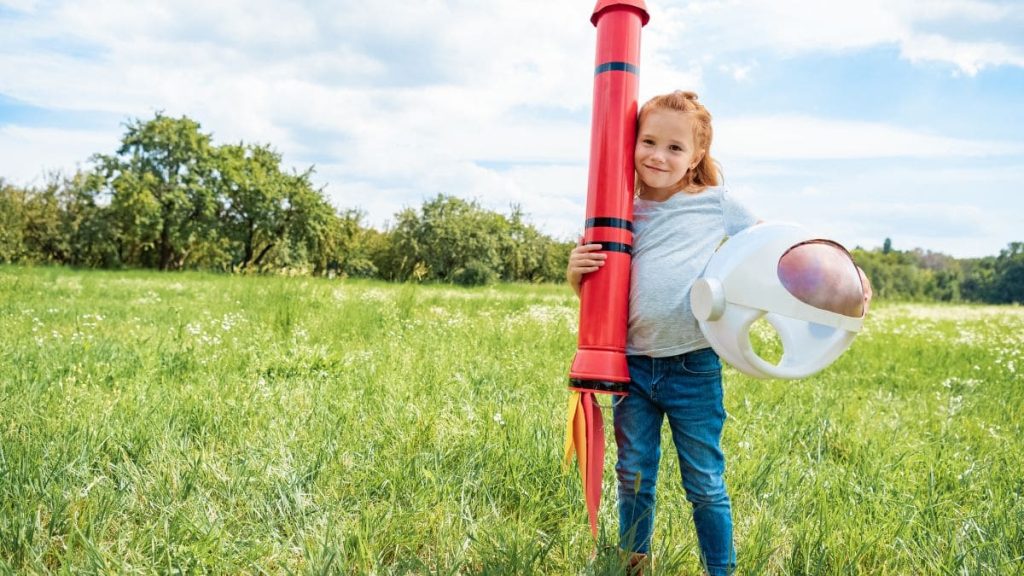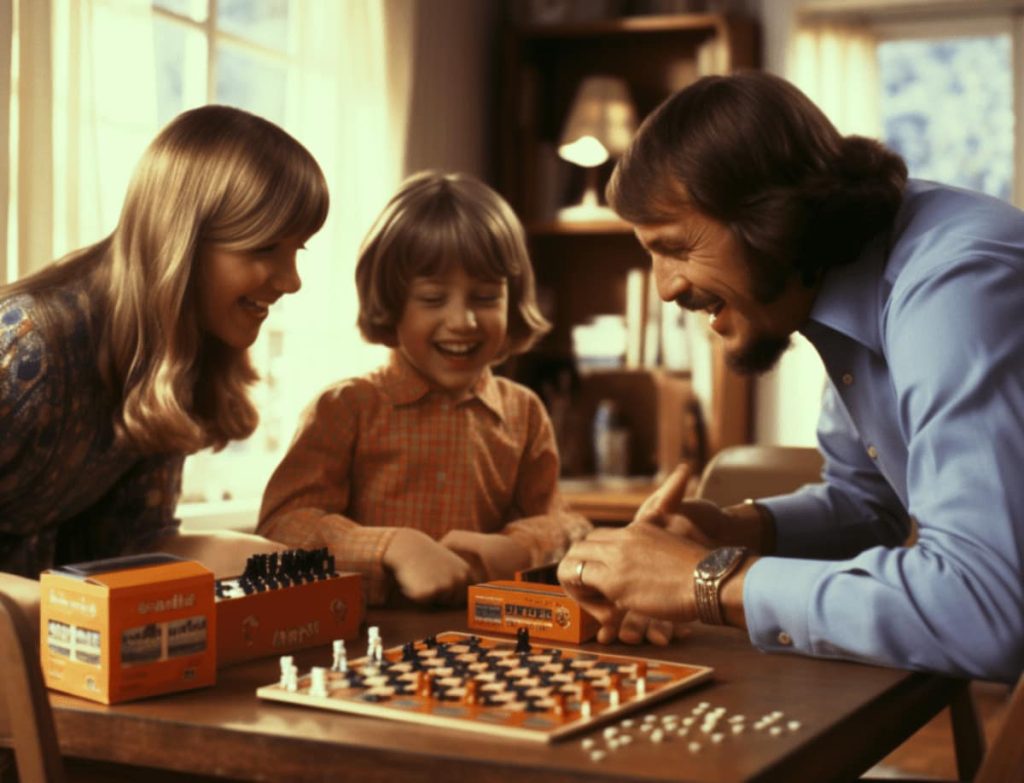Remember when kids could play outside until the streetlights came on? When dinner was a family affair around a table, not in front of a screen? Welcome to parenting in the 70s, a time when parenting was less about structured activities and more about fostering creativity and independence in children.
Let’s take a nostalgic look back at raising kids in a simpler time.
Key Takeaways:
- Kids in the 70s enjoyed more outdoor freedom with unsupervised, unstructured play, which contributed to their social skills and creativity and was vital to their development.
- Family dinners were a technology-free sacred routine that brought families together, offering a chance for bonding over homemade meals, which contrasts with today’s screen-driven, fast-food culture.
- Parenting involved resourcefulness and DIY practices, emphasizing economic frugality and life lessons, reflecting the decade’s economic challenges, and paving the way for sustainable living.
Parenting in the 70s

Today’s kids might find it hard to believe, but there was a time when children roamed the neighborhood until sunset, creating their own games and adventures. The 1970s was a golden era of outdoor play, where kids were encouraged to explore, be creative, and we guess most importantly, be kids.
What, then, were the defining aspects of this outdoor freedom? We’ll examine unstructured adventures, the forgotten virtue of boredom, and the delicate equilibrium between safety and independence.
Unstructured Adventures

In the 70s, a child’s playground was anywhere their imagination took them. With fewer organized activities and less adult supervision, children were left to their own devices. They could explore local parks, climb trees, and make up their own games. This lack of structure not only kept them active but also helped them learn how to problem-solve and socialize with other kids.
It might seem surprising now, but these unstructured adventures were pivotal in their comprehensive development, fostering:
- social skills
- emotional regulation
- creativity
- psychological resilience
The Lost Art of Boredom
“Mom, I’m bored!” Some of us might cringe hearing this from our kids, thinking it’s a waste of time. But back in the 70s, boredom was seen as an opportunity. With no smartphones or tablets to entertain them, children had to use their imagination to fill their free time. Whether it was inventing a new game or simply daydreaming, these periods of boredom sparked creativity, encouraged problem-solving, and helped kids become more aware of their surroundings.
Therefore, while children today may view boredom as a lurking adversary, it was actually a concealed ally during that time for every child.
Safety vs. Autonomy
When it comes to parenting, how do you strike a balance between ensuring your child’s safety and fostering their independence? In the 70s, the scales tipped in favor of autonomy. While modern parents might balk at the idea, children in the 70s often navigated their neighborhoods without adult supervision.
This freedom allowed them to develop vital problem-solving skills, resilience, and a sense of independence.
However, this isn’t a suggestion to disregard safety measures. Rather, it’s about acknowledging the importance of granting children the space they require to develop.
Dinner Time: A Family Affair

If you ask a 70s kid about their fondest childhood memory, chances are family dinners will rank high on the list. Unlike today’s quick meals eaten in front of screens, dinner time in the 70s was a sacred routine. It was more than just eating; it was a time for families to bond, share stories, and build strong relationships.
We’ll travel back to the cherished tradition of dinner time, the absence of screens, and the variation in the menu then versus lunch now.
The Sacred Routine
Picture a typical 70s summer evening. Around 6 pm, families would gather around the dining table for the most important event of the day – dinner. It was a sacred routine that transcended the simple act of eating. This routine brought families closer together, providing a platform for everyone to share their day’s experiences, discuss various topics, and learn about each other.
It also instilled discipline and etiquette in children, as they were expected to follow table manners.
No Screens Allowed
Without screens, dinner table conversations became the main source of entertainment. Families engaged in significant discussions about their day, current happenings, or shared humorous anecdotes. This environment devoid of screens nurtured authentic bonds and enhanced communication skills among family members.
In contrast, nowadays, screens often act as invisible barriers disrupting this wholesome exchange.
The Menu Then and Now
The 70s dinner menu was simple yet delicious, with meals often homemade and hearty. From cheese balls to pasta primavera, these dishes might seem old-fashioned now, but they were the stars of the dinner table back then. Today, with the advent of fast food and takeout meals, our diets have drastically changed.
However, those 70s dinners still hold a special place in the hearts of those who grew up savoring them.
Resourceful Rearing: Making Do and DIY
The 70s were a time of economic challenges, which shaped the parenting style of that era. Parents had to be resourceful, often resorting to DIY methods to save money and create their own parenting resources. Everything from clothes to toys was often homemade, not only out of necessity but also to teach children valuable life skills.
We’ll examine the concept of the patchwork house kid, entertainment created at home, and lessons on being economical.
The Patchwork Kid
Fashion in the 70s was all about:
- Making do with what you had
- Mending, altering, or patching up clothes when they were outgrown or torn
- Teaching children the value of taking care of their belongings
- Emphasizing the importance of reusing and repurposing items
This practice taught children important life lessons and contributed to a more sustainable approach to fashion.
It was a lesson in sustainability, a course in environmental responsibility, long before the term gained popularity.
Homemade Entertainment
In an era before online shopping and electronic toys, children often made do with homemade toys and games. From string telephones to cardboard forts, these simple playthings sparked creativity and resourcefulness. They also encouraged children to use their imagination and learn skills like crafting and problem-solving, traits valuable even in today’s digital world.
Lessons in Frugality
The tough economic climate of the 70s taught families to live within their means. Parents instilled the importance of frugality in their children, teaching them to save, reuse, and make do with what they had, rather than spend recklessly. These lessons in frugality fostered a sense of responsibility and made children appreciate the value of hard-earned money.
Parental Roles and Expectations
The 70s were a time when traditional parental roles were prevalent. Mothers were primarily responsible for childcare and household duties, while the husband or fathers were typically the breadwinners. However, the decade also saw the beginning of shifts in these roles.
We’ll examine the world of 70s moms, the role of dads in mother everywhere, and the issue of shared responsibilities.
Mom’s Domain
Most mothers in the 70s, including one’s own mom, were stay-at-home moms, responsible for their babies:
- managing the home
- taking care of the children
- cooking meals
- helping with homework
They were the primary caregivers. However, the social movements of the era began to challenge these traditional roles, leading to a gradual increase in women working outside the home.
Dad’s Involvement
Fathers in the 70s were primarily responsible for providing for the family. While they were less involved in day-to-day childcare, societal changes and evolving perceptions of fatherhood led to increased involvement.
From playing catch in the backyard to helping their daughter with school projects, fathers began to take a more active role in their children’s lives.
Shared Duties?
Some 70s families initiated the practice of sharing parenting responsibilities though traditional roles were more prevalent. Nevertheless, the decade marked the start of a shift towards more equal parenting.
This shift was not just about equality but also about recognizing the importance of both parents in a woman or child’s life.
Health and Wellness: Then vs. Now
Health and wellness practices have significantly evolved since the 70s. From mental health awareness to the evolution of healthcare, the approach to children’s health has seen some major shifts. We’ll examine the potential health benefits of letting children eat dirt, the increased recognition of mental health, and the progression of healthcare.
Let Them Eat Dirt
It may sound crazy, but children in the 70s were often allowed to get dirty, literally. Playing in the mud, catching bugs, and exploring the outdoors exposed them to various germs. While modern parenting often emphasizes hygiene, this exposure to dirt and germs might have helped boost their immune systems!
Mental Health Awareness
Mental health was a topic less discussed in the 70s. However, the decades since have seen a significant increase in awareness and understanding.
Today, mental health is recognized as an integral part of overall health, leading to better support systems and treatments for children and their families.
The Evolution of Healthcare
Healthcare has come a long way since the 70s. The approach to children’s health has significantly evolved from advancements in medical technology to a greater emphasis on preventive care. While healthcare in the 70s had its limitations, it set the stage for the improvements we see today.
Education and Independence
Education in the 70s was characterized by:
- Less structured learning
- More focus on fostering independence
- Less parental involvement in homework
- Emphasis on experiential learning
- Encouragement for children to take charge of their own education
In this post, we’ll reflect on schooldays, the methodology for homework, and the role of research in preparing children for adulthood.
School Days, School Ways
School in the 70s was a different ball game. With less emphasis on rote learning and standardized testing, education was more about learning through experience. Children were encouraged to explore and discover on their own, fostering creativity and critical thinking.
Homework Help or Hands-Off?
Homework in the 70s was largely the child’s responsibility. While parents offered guidance when needed, they were generally less involved in their children’s homework. This hands-off approach allowed children to develop problem-solving skills, become self-reliant, and learn to manage their time effectively.
Preparing for Adulthood
The 70s approach to education emphasized:
- Academics
- Responsibility
- Self-sufficiency
- Life skills
Parents and teachers focused on preparing children for the challenges of adult life.
The Vehicles of Childhood

Remember the thrill of steering the family car while sitting on dad’s lap? Or the joy of riding your bike without a helmet? The vehicles of childhood in the 70s were certainly less focused on safety and more on fun and freedom.
We’ll take a nostalgia-driven journey through children literally driving cars, adults on bikes without helmets, and the family car.
Children Drive – Literally
It may be a shock to some, but in the 70s, children sometimes got to steer the family car while sitting on their parents’ laps. While this practice is now considered unsafe, it was a common occurrence in that era, reflecting a more relaxed attitude towards safety and a focus on giving children real-life experiences.
Bikes Without Helmets
Just as kids were allowed to steer cars, they were also allowed to ride bikes without helmets in the 70s. This practice, while unthinkable now, was commonplace back then. It was a time when the thrill of riding a bike outweighed the potential risks.
The Family Car
The family car in the 70s was often large, gas-guzzling, and, at times, filled with children riding in the front seat or even the cargo area. These vehicles were a symbol of the family’s status and played a significant role in family outings, road trips, and everyday commutes.
Summary
From the freedom of outdoor play to shared family dinners, from resourceful rearing to hands-off homework help, parenting in the 70s had a unique charm. While some practices may seem outdated or unsafe by today’s standards, they fostered independence, creativity, and resilience in children. It was a simpler time, with its own set of challenges, but it also had its unique rewards.
As we look back at this nostalgic era, it’s clear that although times have changed, the fundamentals of parenting remain the same: to nurture, protect, and prepare our children for the future.
Frequently Asked Questions
What is the hardest year of parenting?
The survey revealed that the majority of parents admitted that the time period between 6-8 was the most brutal and came with the worst meltdowns. This is because young children in their middle school years can face puberty and peer pressure, leading to bad behavior and disagreements.
How was parenting in the 80s?
A sense of autonomy characterized parenting in the 80s, with kids being given the freedom to explore and play without constant supervision or overscheduling. It was a time when children were often told to come back home by dinner or before dark.
What are the four parenting styles?
The four parenting styles are permissive, authoritarian, uninvolved/neglectful, and authoritative, as identified by researchers like Diana Baumrind and Eleanor Maccoby. Each style has distinct characteristics and impacts on the child’s development.
How did the freedom of outdoor play in the 70s affect children’s development?
The freedom of outdoor play in the 70s allowed children to develop independence, problem-solving skills, and resilience while fostering creativity and exploration.
What was the significance of family dinners in the 70s?
Family dinners in the 70s were significant for bonding, sharing stories, building strong relationships, and going beyond just eating together. They provided a time for meaningful connection.






